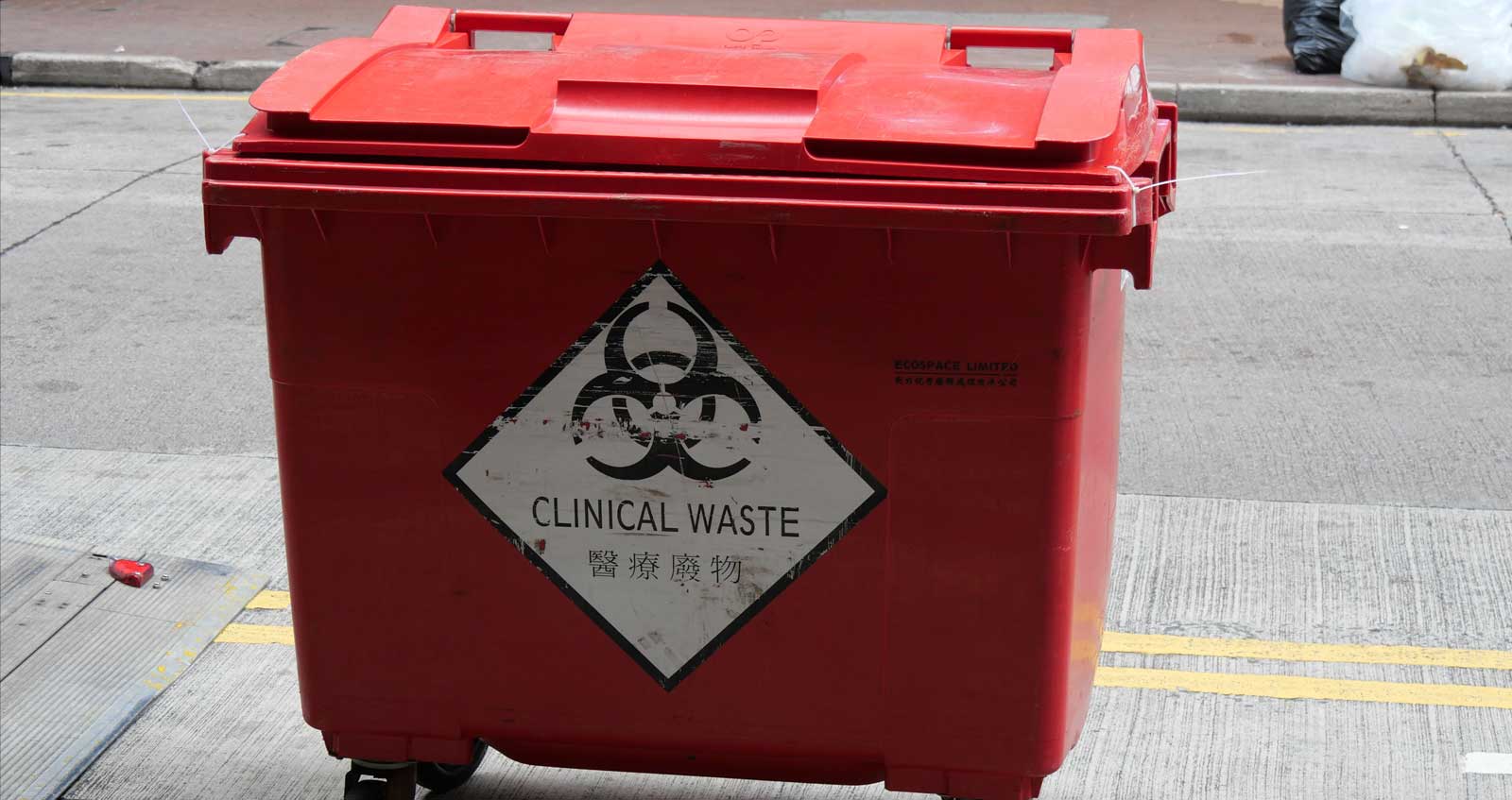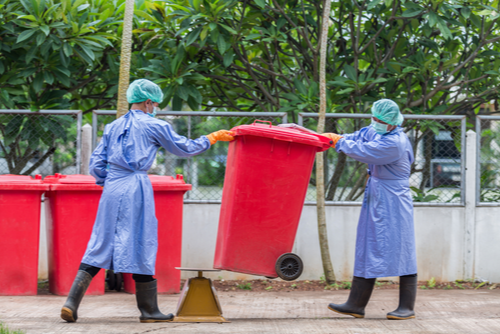Your Trusted Partner: Medical Waste Removal Services Tailored to Your Requirements
Your Trusted Partner: Medical Waste Removal Services Tailored to Your Requirements
Blog Article
Remain Ahead of Regulations: Specialist Guidance on Medical Waste Disposal
In a world where the healthcare sector is frequently developing, it is important for clinical centers to stay ahead of laws when it concerns the proper disposal of clinical waste. With strict guidelines and regular governing adjustments, it can be challenging to navigate the intricacies of this process. Nevertheless, with professional guidance, centers can guarantee compliance and mitigate threats associated with improper waste disposal. From recognizing the various classifications of medical waste to executing the best collection and segregation approaches, this discussion will supply beneficial understandings and workable ideas to assist facilities stay in advance of guidelines in the ever-changing landscape of medical waste disposal.
Recognizing Medical Waste Categories
Comprehending medical waste classifications is important for correct disposal and management in medical care facilities. Medical waste describes any waste created by healthcare tasks that might position a danger to public health or the atmosphere. It is crucial to categorize clinical waste properly to ensure its risk-free handling, treatment, disposal, and transport.
There are numerous categories of medical waste that health care centers require to be acquainted with. The most usual classifications consist of transmittable waste, pathological waste, sharps waste, pharmaceutical waste, and chemical waste. Each classification has particular standards and laws for its proper administration and disposal.
Transmittable waste consists of products contaminated with blood or other bodily fluids, such as gloves, gowns, and lab societies. Pathological waste describes human cells, body organs, or body components that call for special handling and disposal. Sharps waste includes used needles, syringes, and other sharp objects that can cause injury and transmit infections. Pharmaceutical waste makes up ended, unused, or polluted medications that need cautious handling and disposal. Finally, chemical waste consists of solvents, anti-bacterials, and various other chemical compounds made use of in medical care centers.
Staying Up-To-Date With Regulatory Changes
Remaining existing with governing modifications is critical for medical care centers to make sure compliance and appropriate management of medical garbage disposal. medical waste removal services. With guidelines continuously developing, it is essential for medical care centers to stay up-to-date to stay clear of charges, fines, and possible injury to the environment and public health
To remain ahead of regulatory adjustments, health care facilities must establish a system for monitoring and monitoring updates. This can be done by signing up for regulatory e-newsletters, participating in seminars and workshops, and actively joining market associations. In addition, facilities must designate an employee or group in charge of remaining informed and distributing information to appropriate stakeholders.
Normal communication with governing agencies is likewise vital. Health care centers should develop relationships with regional, state, and government agencies to ensure they know any modifications in regulations that may influence their waste management methods. This can be done via regular conferences, engagement in public comment periods, and positive involvement with regulatory companies.
Furthermore, health care facilities need to think about partnering with waste monitoring business that concentrate on medical garbage disposal (medical waste disposal services with WasteX). These companies are commonly fluent in the newest policies and can supply advice and assistance to ensure compliance
Executing Appropriate Collection and Partition Techniques
To properly take care of clinical garbage disposal, health care centers must develop appropriate collection and partition techniques based on governing standards. Applying these methods ensures the safe handling and disposal of possibly hazardous products, shields the setting, and decreases the threat of injuries and infections to health care workers and the general public.
Correct collection and partition techniques involve using marked containers and classifying systems. Health care facilities should provide plainly classified containers for different sorts of medical waste, such as sharps, transmittable waste, pharmaceutical waste, and non-hazardous waste. These containers must be color-coded and clearly marked to stay clear of complication and promote very easy recognition.
Furthermore, healthcare centers ought to train their team on the right procedures for accumulating and setting apart medical waste. This consists of informing them on the different kinds of waste, the proper containers to utilize, and the significance of following laws and guidelines. Regular training sessions and correspondence course need to be read this performed to ensure that personnel members stay up-to-date on finest practices.
Additionally, health care facilities ought to establish a system for routine collection and disposal of medical waste. This may involve partnering with licensed waste monitoring business that concentrate on medical garbage disposal. These companies will certainly make certain that the gathered waste is carried and disposed of in conformity with regulatory demands.
Picking the Right Disposal Methods

Incineration is just one of the most efficient and typical techniques for disposing of certain types of medical waste, such as pathological waste and sharps. It involves the controlled combustion of waste at high temperatures, reducing it to ash. However, incineration can release hazardous contaminants into the air and add to air pollution.

Various other disposal techniques include chemical therapy, microwave treatment, and landfilling. Chemical therapy involves using chemicals to reduce the effects of the waste and disinfect. Microwave therapy uses microwave power to heat and decontaminate the waste. Landfilling involves hiding the waste in a designated garbage dump area (medical waste disposal services with WasteX). However, landfilling must be the last resource as a result of the potential risk of contamination to soil and groundwater.
Making Sure Conformity Via Documents and Training
After meticulously considering the appropriate disposal methods for medical waste, healthcare centers have to make certain conformity with laws and decrease ecological effect by executing efficient documentation and training procedures. This action is crucial in keeping a secure and lasting environment for both medical care employees and the public.

Training is equally crucial in ensuring compliance with policies. Healthcare workers that take care of medical waste ought to get ideal training on waste segregation, dealing with, and disposal treatments. This training needs to cover subjects such as the proper use personal protective devices, recognition of various kinds of waste, and the proper disposal methods for each waste group. By offering extensive training, health care centers can encourage their team to make enlightened choices and decrease the threat of inappropriate garbage disposal.
Verdict
To conclude, remaining in advance of guidelines in medical waste disposal is important for healthcare centers. medical waste removal near me. Recognizing the various categories of medical waste, staying updated with regulatory adjustments, carrying out correct collection and segregation approaches, picking the ideal disposal techniques, and making sure compliance via paperwork and training are all vital steps. By adhering to these standards, healthcare companies can successfully manage and get rid of of clinical waste in a liable and risk-free fashion
From recognizing the different groups of medical waste to applying the ideal collection and segregation techniques, this discussion will certainly provide workable tips and useful insights to assist centers stay in advance of policies in the ever-changing landscape of clinical waste disposal. - medical waste disposal services with WasteX
The most usual groups include infectious waste, pathological waste, sharps waste, pharmaceutical waste, and chemical waste. Health care centers ought to supply plainly classified containers for various kinds of clinical waste, such as sharps, transmittable waste, pharmaceutical waste, and non-hazardous waste. Medical care centers need to develop a comprehensive system to tape-record and track all aspects of medical waste disposal, including types of waste generated, quantities, and disposal methods made use of. Medical care employees that take care of clinical waste must get proper training on waste partition, taking care of, and disposal treatments.
Report this page